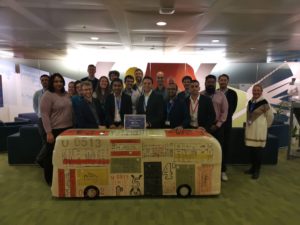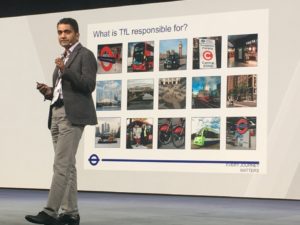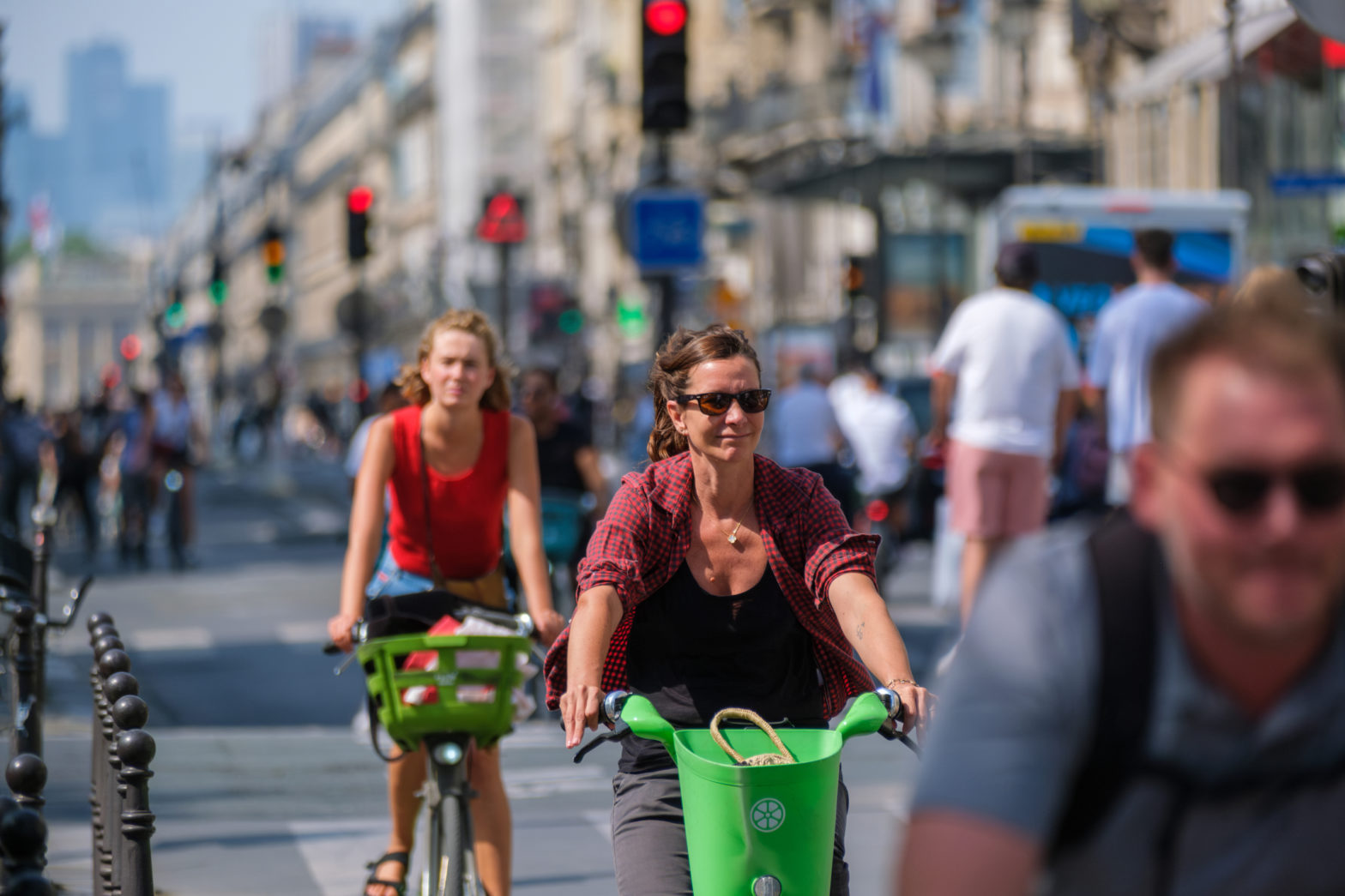
Photo: TfL
TfL’s Rikesh Shah on innovation and the new normal
28 July 2021
by Christopher Carey
Innovation is a difficult term to define. For years Silicon Valley has liked to believe it had the upper hand, leading the way and creating a culture for others to follow.
But for Rikesh Shah, Transport for London’s Head of Commercial Innovation, its meaning is simple.
“Innovation isn’t blue sky thinking, bean bags and pool tables – it is about solving real-life problems and creating value,” he said.
For the past four years, Shah has led the strategic vision for one of the world’s largest transport agencies, merging the latest technological developments across the public and private sector to make life easier and more accessible for the UK capital’s nine million residents.
But the past year has brought enormous challenges – with a depleted ridership, huge rise in deliveries, and a financial black hole putting pressure on the city’s resources and capacity to operate.
When looking for answers to these problems, TfL turns to its innovation arm for inspiration.
Shah leads a matrix team in the agency’s commercial innovation department – where staff are often brought in from across the organisation to roll up their sleeves and pitch in.
 “People take their badges off, and we work to the culture of ‘if we can prove it, and there is a business case we take it forward’, but if we can’t, we learn from it and we apply our learning to the next project.”
“People take their badges off, and we work to the culture of ‘if we can prove it, and there is a business case we take it forward’, but if we can’t, we learn from it and we apply our learning to the next project.”
As the department’s goals are often aligned with the wider city agenda, Shah also works closely with London’s Chief Digital Officer, Theo Blackwell, and the London Office of Technology and Innovation (LOTI).
“What’s fantastic about London is that we’ve got this ecosystem of public players and actors, as well as the private sector, and quite often there’s this sweet spot where we all want to make the city better,” Shah commented.
“And I think that’s possible because of the nature of our city, the entrepreneurial and creative spirit, but also the willingness for people to want to collaborate and develop solutions, and quite often these are win-wins.”
COVID-19 impact
But the past year has put considerable strains on TfL’s capacity to operate, with a huge drop in ridership resulting in a financial meltdown that led to three government bailouts totalling £4 billion (US$5.5 billion).
Unlike most major transit operators, London is heavily dependent on fare income. Pre-pandemic, fares accounted for 72 percent of TfL’s income, compared to approximately 41 percent in New York and 36 percent in Paris.
In January 2021, TfL unveiled its Financial Sustainability Plan, a strategy it claims will – with long-term stable funding – decarbonise transport by 2030, helping achieve national environmental targets.
But the rapid rise in home deliveries, coupled with the gradual return of cars to streets has put increased pressure on road space – exacerbating an issue which has always been hotly contested in the UK capital.
Freight lab project
To control this space more effectively, Shah’s team went to the market for solutions, launching the London FreightLab in winter 2020 – just before the start of the pandemic.
Collaborating with private sector innovators, the ‘Lab’ was established to reduce the impact of freight in the city and has become increasingly relevant over the past year as home deliveries have soared.
During the initial pilot stage, six firms – AppyWay; EMSOL; ENSO Tyres; Fernhay Partners; Ford Mobility; and Humanising Autonomy – were selected and provided with £20,000 in funding each, land sites and subject matter expertise to develop innovative ideas to make the way goods move around the city safer, cleaner, and more efficient.
Some projects have already started, and others are expected to roll out in the coming months.
“One example of the pilot is the project we’re undertaking with Humanising Autonomy,” Shah said.
“They are helping with road safety by using dash cams and aggregating that information to use in training courses for drivers that might be able to change their behaviour.”

Shah admits that managing such hands-on projects with a home-based working environment has presented challenges, but feels his team has adapted well.
“Initially it was a bit of a shift and a cultural challenge, but I think what we’ve found over time has made it a bit easier,” he said.
“Particularly when you have different time zones and different locations with some of the innovators that we work with, sometimes in an office it’s hard to match everyone up.
“But of course, you can’t see them when they’re installed on the ground, so that can be a challenge.”
Bosch
Pre-pandemic, one of the key questions facing the commercial team was how to reduce congestion and improve air quality on London’s streets. In looking for answers, Shah formed a partnership with Bosch in November 2018 that has since seen TfL collaborate with the German firm on several projects to boost traffic flow, improve road safety, and help reduce air pollution.
In the borough of Lambeth, the pair incorporated data to define, implement and evaluate a new traffic signalling timing strategy to improve localised air quality.
‘Floating car data’ (with HERE Technologies, in collaboration with Bosch) was used to automatically record TfL traffic flow and vehicle fleet data, together with air quality monitors and modelling capabilities, to provide evidence that enabling a smoother flow of traffic can help reduce harmful emissions across the capital.
In another small-scale trial in the same borough, artificial intelligence and digital imaging was used to help identify near-miss incidents at a pedestrian crossing.
This has laid the foundations for potential lifesaving future work to bring London closer to its Vision Zero target of having no deaths or serious injuries on its roads by 2041.
Based on the experience from the Bosch trial, TfL is now developing a framework to use as a blueprint for partnering with other firms on new co-innovation projects.
In November 2020, TfL issued an Expression of Interest (EOI) to gauge market feedback on this.
Active travel
One of the few upsides of the pandemic has been the huge expansion of cycling and pedestrian initiatives across the capital that have boosted confidence and given more authority to active travel.
London’s schemes, which have sprung up over the past year, include wider pavements, pop-up cycle lanes, and low-traffic neighbourhoods (LTNs) – where traffic into residential neighbourhoods has been restricted using cameras or physical measures such as planter pots.

Administered by both local borough councils and TfL, the schemes have proved largely popular with residents – despite some initial concerns around access to emergency services, which have been mostly addressed, and claims that even more congestion is being caused.
An October YouGov poll – commissioned by Greenpeace – found that where UK residents had opinions on LTNs, positive views were three times more likely. Of the 2,027 surveyed, 57 percent were in favour of the new measures and 16 percent against, while 32 percent had no opinion.
Looking at the bigger picture, Shah believes London is on the right track, but recognises it cannot afford to be complacent.
“When it comes to people using active travel and sustainable forms of transport, such as public transport, we really need to keep focused,” he said.
In 2000, 50 percent of travel was by active and sustainable modes, Shah noted, and just before the pandemic, it was around 64 per cent.
“We have target by 2040 where we want it to be 80 percent,” he said. “So I think seeing how the innovation team can help achieve that is our main focus.”
On a personal note, Shah himself is a big fan of the initiatives being rolled out, saying they have helped boost his health: “It has been amazing to see my wife and my children take up training courses on bikeability – my son’s just doing it this week – and seeing him on a bike has personally changed our standard of life.
“It’s fantastic that we are now being more active as a family and appreciating the benefits of being more active – I think I’ve even lost some weight in the past couple of weeks.”
E-scooters
As part of efforts to provide socially distanced travel alternatives, the UK government fast-tracked the introduction of legislation to legalise e-scooters last summer.
Through a series of city-led trials, the micromobility devices have slowly started to become part of the country’s transport ecosystem, with London’s trials kicking off last month.
“We’ve seen tens of thousands of hires across the trial area so far and will be monitoring the trial over the coming weeks and months to ensure it’s working for everyone with safety at the core,” Shah said.
But with lockdown restrictions having ended this month, the need for TfL to be proactive and use all tools at its disposal to avoid a car-led recovery will be key.
Shah explained: “We’re certainly starting to see more people travelling now, but we have to provide the supply – whether that’s cycling lanes, walking routes or public transport provision.
“We should be encouraging people to use public transport when they need to, re-timing their journeys and travelling in the quiet times and continuing to do everything we can to keep customers and staff safe.”

Reflecting on his work and TfL’s future, Shah is optimistic about what lies in store: “Innovation is in the DNA of TfL. Whether it was the first tube service [in 1863], or the first tram line and traffic lights [in the 1860s], we’ve continued to innovate over the last 150 years.
“It’s in our culture and that’s what we should continue to do going forward, and that’s one of the reasons why the innovation team has been set up, to act as a catalyst within the organisation, to bring new ideas in, whether it’s through mobility or other forms of innovations.”
He added: “London wants us to be more innovative – when we ask our customers what they want, they say they want value for money, progress and innovation. And our job is to make the lives of our customers better and make our city better.
“We’re there to diplomatically challenge the status quo.”







